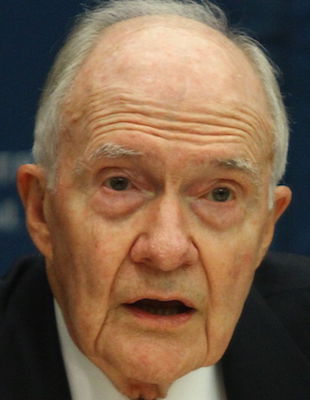By Jonathan Power* | IDN-InDepthNews Viewpoint
LONDON – There are three schools of thought in American foreign policy: two you have heard about and a third that is relegated to the background.
The first and arguably the most prominent is the neo-conservative. These people, in the days of the Soviet Union, were the rabid anti-communists who wanted to beat the Soviet Union into the ground with vastly increased spending on defence.
Today they are the ones who supported the extreme right wing agitators who overthrew the middle-of-the-road president of Ukraine, Wiktor Yanukovich. They supported President George Bush’s wars in Iraq and Afghanistan and want President Barack Obama to intervene in Syria.
The second is the liberal. Liberals have always wanted to seek nuclear arms limitations with Moscow. They wanted an end to apartheid in South Africa. But many of them also believe in directly interfering in a country that is carrying out inhumane policies. They persuaded President Barack Obama to intervene in Libya’s civil war which left a political mess that has become a haven for ISIS. Some of them have argued for intervention in Syria’s civil war. They also, in tandem with the neo-conservatives, successfully persuaded Obama to pursue an anti-Russian policy in Ukraine.
Then there are the “realists”. People like the late greats: George Kennan, Hans Morgenthau, Reinhold Niebuhr and Walter Lippmann. In many ways Obama is a realist, although not consistently. He has succumbed to both liberal and neo-conservative advice.
The realists don’t get much airtime. Their advice is usually pushed aside by foreign policy makers in favour of one or two, depending on who wins a presidential election.
Stephen Walt, a professor of international affairs at Harvard, writes in Foreign Policy that “realism sees power as the centerpiece of political life and sees states as primarily concerned with ensuring their own security. Realists believe military power is essential to preserving a state’s independence and autonomy but they recognize it is a crude instrument that often produces unintended consequences. Realists have a generally pessimistic view of international affairs and are wary of efforts to remake the world according to some ideological blueprint.”
If presidents Bill Clinton, George W. Bush and Barack Obama had implemented realist ideas how would the world have looked today?
If Bush had listened to some Republican realists like former national security advisor, Brent Scowcroft and the former chief of staff of the military, Colin Powell, there would have been no invasion of Iraq in 2003. In Afghanistan there would not have been America’s longest war, but only a quick surgical operation to neutralize Al Qaeda. Once in office Obama would have moved swiftly to wind the U.S. military presence down.
Today Iraq and Afghanistan would be at peace and ISIS would not exist. The several trillion dollars spent could have been used for pressing social and infrastructural needs at home.
Under Bill Clinton the U.S., breaking a solemn promise, would not have pushed the expansion of NATO towards Russia’s borders, poisoning relations with Moscow.
Realists would have also not tried to push Georgia and Ukraine into the Western orbit. Unlike the neo-conservatives they wouldn’t have called for their membership of NATO. If the realists had prevailed the Crimea would still be part of Ukraine and the fighting in the east would not have happened. Ukraine would have had two complementary trade agreements, one with the EU and one with Moscow’s Eurasian Economic Union. Instead the U.S. and EU encouraged people to demonstrate in favour of the former and against the latter, even sending American officials to join the crowd.
The realists see their ideas triumphant in the negotiations with Iran that led to its commitment to making sure that it does not develop nuclear weapons. But if realism had been the policy under Bush, Iran’s nuclear infrastructure would have been much smaller and Iran easier to negotiate with.
Likewise realism could have led to a peace deal and nuclear disarmament with North Korea.
The neo-conservatives with some liberal support have defended Israel 100% in its determination not to concede ground to the Palestinians. Realists have long felt that such support is not good for America’s image in the world, that it has encouraged terrorism and persuaded many Israeli politicians that they should create a “greater Israel” at the expense of the Palestinians. Too often the U.S. appears to act as “Israel’s lawyer”.
Realists would have grasped the nettle and negotiated with Syria’s President Bashar al-Assad years ago, recognizing that a tough and ruthless dictator was better than the carnage we have seen. This would have avoided the worst of the civil war. One could make the same observation about dealing with Iraq’s Saddam Hussein and Libya’s Muammar al-Gadhafi.
The major newspapers have no realist columnist. Realist voices are heard mostly only in top academic circles. This is not good for America. It is not good for the world.
*Jonathan Power is British and grew up in Oldham and Liverpool. He is a journalist, filmmaker and writer who is best known for his weekly column on foreign affairs that ran in the International Herald Tribune (now the International New York Times) for 17 years. He was the paper’s only continuous, non-American, European-based, foreign affairs columnist. For twenty years his longer articles appeared in Encounter, Prospect and World Policy Journal. [IDN-InDepthNews – 16 February 2016]
IDN is flagship of the International Press Syndicate.
Photo: Brent Scowcroft, Former U.S. National Security Advisor, speaking at the Center for Strategic and International Studies in Washington, D.C. in July 2013 | Credit: Ajswab – Wikimedia Commons
2016 IDN-InDepthNews | Analysis That Matters
Send your comment | Subscribe to IDN newsletter
Follow us on Twitter and Facebook:
http://twitter.com/InDepthNews
http://www.facebook.com/IDN.GoingDeeper

